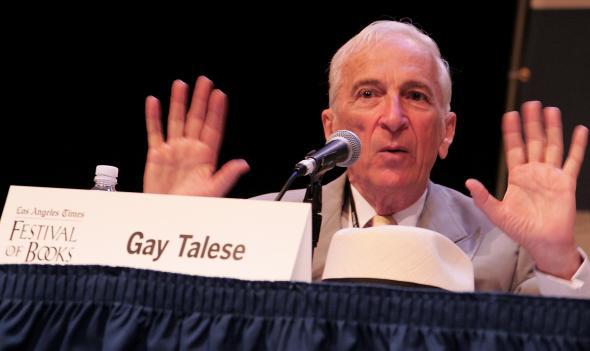Every few weeks or so, the Nieman Foundation asks a journalist to “annotate” a story he or she has written, to provide some insight into the reportorial process and talk through some of the mechanics of building a narrative. The series is called “Annotation Tuesday!,” and a recent annotation is by Gay Talese of his classic 1966 Esquire profile “Frank Sinatra Has a Cold.”* In it, Talese makes the following candid admission:
The reason I don’t use a tape recorder is I don’t want the tape recorder to contradict what I think is potentially a better quote. My idea of interviewing is to get as best I can out of the mouth of somebody else their best thought—the most ideal representation of what they think, not what they say.
What Talese is describing is what journalists might call “fabricating quotes,” in his case capturing the spirit of what was said but, presumably, adding poetry or panache. This is perhaps willfully deceitful and, arguably, in a different category than the more innocent practice of “approximate quotations,” though they too play a role in perpetuating a culture of carelessness. I’m reminded of a decidedly unscientific experiment I did in the summer of 2012, during the presidential campaign, after Mitt Romney gave a stump speech in Des Moines, Iowa—the sort of situation in which approximate quotations are, I thought, least likely to happen.
Romney’s speech was recorded and posted on CSPAN later the same day. Dozens of journalists produced dozens of stories about the speech, so the same bits are likely to be quoted more than once. Various political partisans are sure to monitor the stories and to object to any perceived inaccuracies. And the journalists covering the event know all of this. The level of scrutiny and accountability in this case is sure to be much higher than for the quotes of an individual interview with some random source—or Frank Sinatra Jr., for that matter—where there’s no independent evidence about what was said and no one really cares except the source and his mother.
Despite this, all of the quotes (that I checked) in media coverage of Romney’s Des Moines speech were approximate. Here’s one passage that was widely quoted:
“In a very careful executive action, he removed the requirement of work from welfare,” the GOP presidential candidate said at an early-morning rally at a downtown Des Moines school.
“It is wrong to make any change that would make America more of a nation of government dependency. We must restore, and I will restore, work for welfare!” he said to loud cheers and applause from the crowd of about 700. (USA Today)
“With a very careful executive action, [Obama] removed the requirement of work from welfare,” Romney said. “It is wrong to make any change that would make America more of a nation of government dependency. We must restore it, and I will restore work in welfare.” (Washington Post)
“It is wrong to make any change that would make America more of a nation of government dependency,” Romney said. “We must restore work in welfare.” (ABC News)
On Wednesday, Romney doubled-down on the attack, telling an audience in Des Moines, Iowa that Obama’s new rules will help create a “nation of government dependency.”
“I will restore work to welfare,” Romney added. (NY Daily News)
What he actually said was different from all of these:
Now he’s president.
And just a few days ago, he uh he put that original intent in place.
With a very careful executive action,
he removed the requirement of wel- work from welfare.
It is wrong
to ch- to make any change that would make America
more of a nation of government dependency.
We must restore, and I will restore, work into welfare.
It makes sense to remove the filled pauses and the false starts, and to introduce standard paragraphing, giving us something like this:
Now he’s president. And just a few days ago, he put that original intent in place. With a very careful executive action, he removed the requirement of work from welfare.
It is wrong to make any change that would make America more of a nation of government dependency. We must restore, and I will restore, work into welfare.
But still, every one of the journalistic quotations was approximate. And local papers don’t seem to be much different from the national ones. Here’s the Waukee Patch:
“I want to make sure that our adults and kids have the skills to succeed,” Romney said. “What happens here at Central Campus is that young people are able to come here and get skills that let them get the jobs they have today.”
What he actually said:
I want to make sure that our adults and our kids
have the skills to succeed.
What happens here at Central Campus is that young people
and some a little older
are able to come here and get skills of a wide variety
that will allow them to be successful in the jobs of today.
It would appear that direct quotes in newspaper and magazine articles are almost always approximate at best. Are the approximations malicious? Usually not. They typically occur because the quotes are based on writers’ notes and memories. Do the approximations matter? Again, usually not. But then there’s a long slide through confusion and bias into intentionally misleading quote-mangling and outright fabrication, a slide it seems that Talese long ago decided to take.
Modern technology makes it easy to record most speeches and interviews, and to remove most forms of approximation from quotations. Isn’t it time for this aspect of journalism to limp into the 21st century?
*Correction, Oct. 25, 2013: This post originally identified the series as “Storyboard.”
